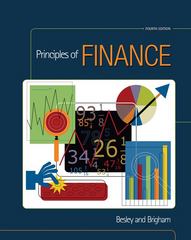Question
4. CFA Examination Level II Takeda Development Corporation has issued a $100 million floating rate note (FRN) that will mature in three years. The FRN
4. CFA Examination Level II
Takeda Development Corporation has issued a $100 million floating rate note (FRN) that will mature
in three years. The FRN has quarterly coupons equal to three-month LIBOR, payable in arrears
and due on the first business day of each quarter. Anne Yelland, Takeda Developments Treasurer,
wants to hedge against an increase in three-month LIBOR during the remaining term to maturity of
the FRN. To implement the hedge, she realizes she can use either of two alternatives: An interest
rate cap or a package of over-the-counter (OTC) call options on interest rates.
a. State whether, to correctly implement the hedge using each of the two alternatives,Yelland should:
i. buy or sell an interest rate cap
ii. buy or sell a package of over-the-counter (OTC) call options on interest rates
Discuss one requirement that both alternatives must meet for Yellands hedge to be effective.
Yelland decides to implement the hedge using an interest rate cap with the following characteristics:
The reference rate on the interest rate cap is three-month LIBOR.
The cap rate (strike rate) is 5.50 percent.
The length of the agreement is for the remaining three-year life of the FRN.
The notional principal of the cap is $100 million.
There is quarterly settlement of the cap, payable in arrears.
The following table shows the three-month annualized LIBOR observed on the first business day of each
quarter during the first year of the cap.
THREE-MONTH ANNUALIZED LIBOR BEGINNING OF
EACH QUARTER
Quarter Three-month Annualized LIBOR
1 4.50%
2 6.50%
3 7.50%
4 7.00%
b. Compute the payoff (in dollars) to the interest rate cap at the beginning of each of the following
two quarters:
(1) Quarter 2
(2) Quarter 3
7. You are considering the purchase of a convertible bond issued by Bildon Enterprises, a noninvestment-
grade medical service firm. The issue has seven years to maturity and pays a semiannual
coupon rate of 7.625 percent (i.e., 3.8125 percent per period). The issue is callable by the company
at par and can be converted into 48.852 shares of Bildon common stock. The bond currently sells
for $965 (relative to par value of $1,000), and Bildon stock trades at $12.125 a share.
a. Calculate the current conversion value for the bond. Is the conversion option embedded in this
bond in the money or out of the money? Explain.
b. Calculate the conversion parity price for Bildon stock that would make conversion of the bond
profitable.
c. Bildon does not currently pay its shareholders a dividend, having suspended these distributions
six months ago. What is the payback (i.e., break-even time) for this convertible security and how
should it be interpreted?
d. Calculate the convertibles current yield to maturity. If a straight Bildon fixed-income issue
with the same cash flows would yield 9.25 percent, calculate the net value of the combined
Step by Step Solution
There are 3 Steps involved in it
Step: 1

Get Instant Access to Expert-Tailored Solutions
See step-by-step solutions with expert insights and AI powered tools for academic success
Step: 2

Step: 3

Ace Your Homework with AI
Get the answers you need in no time with our AI-driven, step-by-step assistance
Get Started


